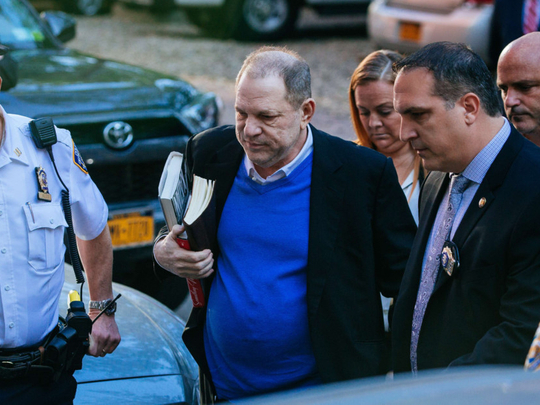
The arrest of Harvey Weinstein on sexual assault charges in an incident that took place more than a decade ago almost didn’t happen. In fact, it wouldn’t have happened in many other states that, unlike New York, impose a statute of limitations in cases of rape.
The charges against the disgraced media mogul stem from 2004, when actress Lucia Evans claims she was forced to perform [a sexual act] on Weinstein in his Tribeca office. (A second incident involving an unidentified woman is alleged to have occurred in 2013.)
The previous statute of limitations in New York was five years in cases of first-degree rape, defined as forcible sexual intercourse, and forcible sexual conduct (known as criminal sexual act in the first degree). But in 2006, that barrier was eliminated, meaning that there would be no time limit for bringing charges in the most serious sexual assault cases.
Ironically, New York’s decision to remove the statute of limitations for forcible sexual assault prosecutions had nothing at all to do with the kind of predatory behaviour alleged in Weinstein’s case. Instead, in New York and elsewhere, the rationale for extending or removing statutes of limitations was largely a response to new possibilities for DNA testing in cases of stranger rape; the emergence of DNA testing meant the prospect that, even many years after an incident, an assailant could be matched to the crime.
More than a decade later, and with the rise of the #MeToo movement that the allegations against Weinstein helped to advance, the impetus for expanding statutes of limitations has changed, in keeping with the reality that acquaintances and intimate partners commit the vast majority of sexual assaults. Today, it is not scientific developments but evolving cultural understandings that sit uneasily with short statutes of limitations.
Women have long been reluctant to report sexual harassment and sexual violence by acquaintances, especially when the abuser has the power to retaliate. Apart from risking personal and professional penalties, would-be accusers often feared that their allegations would be met with scepticism. In the Weinstein case, dozens of women were unwilling to come forward with their accusations of sexual misconduct at the time of the alleged incidents. Now, at least in part because cultural norms around sexual abuse are shifting, survivors are speaking up.
It seems unjust for the law to provide impunity for their abusers. This may explain why several states have recently abolished statutes of limitations in rape cases (as California did in 2016), a trend that was galvanised by the pileup of accusations against Bill Cosby. Still, about half the states impose a statute of limitations in cases of rape.
Competing considerations
States considering easing these limits should weigh competing considerations, including minimising the dangers of deteriorated or lost evidence, and encouraging prompt reporting and prosecution. Still, the case for lifting rigid statutes of limitation in sexual assault cases has grown ever more powerful in recent years.
Throughout the country and across disparate industries, women are increasingly willing to disclose allegations that would once have been dismissed as not credible or trivial. In the court of popular opinion, at least, these allegations — which, not coincidentally, tend to be corroborated by those of many others — are being met with growing receptivity.
As people become more familiar with how sexual violence is perpetrated — normally not by a stranger in an alley with a knife — long-standing myths and biases will loosen their hold. More sexual violence survivors will feel empowered to recount violations to family members, friends, neighbours, co-workers and even law-enforcement officials. The possibility of justice, even justice delayed, offers compelling reason for survivors to tell their stories.
Meanwhile, the risks of extending the statute of limitations seems relatively low. The standard for convicting a person of a crime — proof beyond a reasonable doubt — is rightly a high one, and most older cases will not be provable. With older accusations, the kind of corroborative evidence that is key to persuading jurors is generally harder to obtain. Even well-corroborated accusations of sexual assault do not always result in prosecution, much less conviction.
The ripple effects of women coming forward with their accounts — even after the passage of time — might begin to correct for the widespread discounting of women’s credibility. The law should not stand in the way of this progress.
— Washington Post
Deborah Tuerkheimer, a former assistant district attorney in Manhattan, is a professor of law at Northwestern University.










